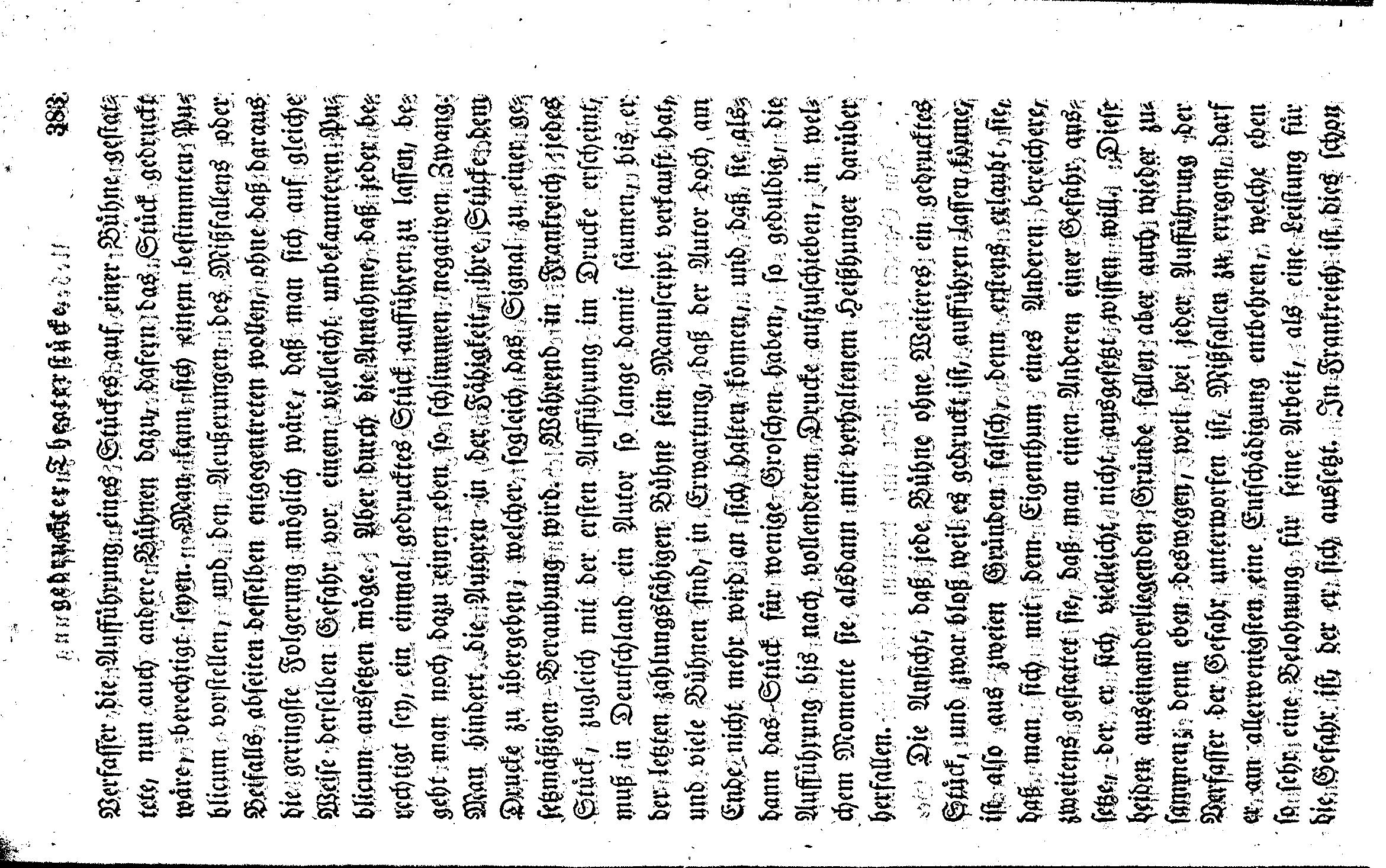PRIMARY SOURCES
ON COPYRIGHT
(1450-1900)
Browse Documents By...
Original Language...
Documents For...
Browse Commentaries By...
Browse Referred Persons By...
Gans: On the right to perform published stage plays, Berlin (1832)
Source: Private Collection
Citation:
Gans: On the right to perform published stage plays, Berlin (1832), Primary Sources on Copyright (1450-1900), eds L. Bently & M. Kretschmer, www.copyrighthistory.org
Back | Record | Images | Commentaries: [1]
Translation only | Transcription only | Show all | Bundled images as pdf
383 of published stage works
the author has permitted the performance of his play on one
particular stage, other stages, assuming that the play were
to have been published, would then be entitled to do the
same. One may be prepared to present oneself before a specific
audience and to face the latter's possible disapproval or
applause without, though, this implying in any way that one
is willing to expose oneself in the same way to the same risk
with regard to an audience that one may perhaps not be familiar
with. But by the assumption that everyone is entitled to
stage a play once it has been published, one is also committing
an act of negative coercion that is just as bad. For one is
thereby hindering authors in their capability to submit their
plays for publication, given that the latter is interpreted
as the signal to go ahead with an allegedly legal act of robbery.
Whereas in France every play appears in print at the same time
as it has its stage première, an author in Germany must wait
for this until he has sold his manuscript to the last stage
that is able to pay, and many theatres, expecting that the
author will eventually not be able to control himself any longer,
and that they will then be able to acquire the play for a few
groschen, are patient enough to postpone the performance until
the publication of the play has been completed, whereupon they
rush in upon it with all the fury of suppressed ravenous hunger.
The view that any theatre can stage a published play just
like that, simply because it has been published, is therefore
wrong for two reasons: firstly, it allows one to enrich oneself
with another's property, and, secondly, it means exposing someone
else to a risk which that person may not want to incur in the
first place. These two disparate reasons, however, come down to
the same thing precisely because given that at every performance
the author is exposed to the risk of provoking displeasure, he
is all the more entitled to a compensation which is just as much
a reward for his labour as a benefit [in the sense of insurance]
for the risk to which he is exposing himself. In France this has
No Transcription available.
Source: Private Collection
Citation:
Gans: On the right to perform published stage plays, Berlin (1832), Primary Sources on Copyright (1450-1900), eds L. Bently & M. Kretschmer, www.copyrighthistory.org
Back | Record | Images | Commentaries: [1]
Translation only | Transcription only | Show all | Bundled images as pdf
383 of published stage works
the author has permitted the performance of his play on one
particular stage, other stages, assuming that the play were
to have been published, would then be entitled to do the
same. One may be prepared to present oneself before a specific
audience and to face the latter's possible disapproval or
applause without, though, this implying in any way that one
is willing to expose oneself in the same way to the same risk
with regard to an audience that one may perhaps not be familiar
with. But by the assumption that everyone is entitled to
stage a play once it has been published, one is also committing
an act of negative coercion that is just as bad. For one is
thereby hindering authors in their capability to submit their
plays for publication, given that the latter is interpreted
as the signal to go ahead with an allegedly legal act of robbery.
Whereas in France every play appears in print at the same time
as it has its stage première, an author in Germany must wait
for this until he has sold his manuscript to the last stage
that is able to pay, and many theatres, expecting that the
author will eventually not be able to control himself any longer,
and that they will then be able to acquire the play for a few
groschen, are patient enough to postpone the performance until
the publication of the play has been completed, whereupon they
rush in upon it with all the fury of suppressed ravenous hunger.
The view that any theatre can stage a published play just
like that, simply because it has been published, is therefore
wrong for two reasons: firstly, it allows one to enrich oneself
with another's property, and, secondly, it means exposing someone
else to a risk which that person may not want to incur in the
first place. These two disparate reasons, however, come down to
the same thing precisely because given that at every performance
the author is exposed to the risk of provoking displeasure, he
is all the more entitled to a compensation which is just as much
a reward for his labour as a benefit [in the sense of insurance]
for the risk to which he is exposing himself. In France this has
No Transcription available.












